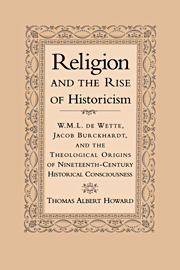 Religion and the Rise of Historicism
Religion and the Rise of Historicism Book contents
- Frontmatter
- Contents
- Acknowledgments
- Introduction: History, Theology, and Modernity
- 1 W. M. L. de Wette: Enlightenment, Romanticism, and Biblical Criticism
- 2 De Wette and Schleiermacher at Berlin (1810–1819): Politics, History, and the Post-Enlightment Transformation of Theology
- 3 De Wette, D. F. Strauss, and the New Christusbild
- 4 Basel, Burckhardt, and de Wette
- 5 History without Centaurs
- Abbreviations: Used in Notes and Bibliography
- Notes
- Bibliography
- Index
5 - History without Centaurs
Published online by Cambridge University Press: 02 December 2009
- Frontmatter
- Contents
- Acknowledgments
- Introduction: History, Theology, and Modernity
- 1 W. M. L. de Wette: Enlightenment, Romanticism, and Biblical Criticism
- 2 De Wette and Schleiermacher at Berlin (1810–1819): Politics, History, and the Post-Enlightment Transformation of Theology
- 3 De Wette, D. F. Strauss, and the New Christusbild
- 4 Basel, Burckhardt, and de Wette
- 5 History without Centaurs
- Abbreviations: Used in Notes and Bibliography
- Notes
- Bibliography
- Index
Summary
Our task, in lieu of all wishing, is to free ourselves as much as possible from foolish joys and fears and to apply ourselves above all to the understanding of historical development.
– Burckhardt, Historische FragmenteThe philosophy of history is a centaur.
–Burckhardt, Über das Studium der GeschichteFranz overbeck (1837–1905), professor of theology and church history and colleague of both Burckhardt and Nietzsche at the University of Basel, once commented that Burckhardt's work as a historian had its “deepest roots” in a desire to overcome prejudices inherited from Christianity. Overbeck praised Burckhardt for his “amazingly unbiased point of view” even though “his education and entire upbringing were so strongly stamped by Christian influence.” In the present chapter I show that one of Burckhardt's principal aims as a historical thinker was indeed to distance himself from his own Christian past by constructing a “profane” history of the emergence and decline of Christianity in Europe. However, unlike Overbeck, I argue that despite Burckhardt's avowed secularism, a strong theological undercurrent persisted in his thought.
The undercurrent was not the characteristic nineteenth-century historical optimism, often regarded as the secularization of Christianity's eschatological content. On the contrary, what one sees in Burckhardt is nearly the opposite: a deep-seated historical and cultural pessimism inherited from the idea of original sin. The character of Burckhardt's early religious life is exhibited not only in the relationship with his father, discussed earlier, and in his catechetical training but also in the pronounced spiritual sensitivity of his youthful poems and sketches, in which two prominent medieval motifs recur: the Last Judgment and Basel's famous “dance of death” (Totentanz).
- Type
- Chapter
- Information
- Religion and the Rise of HistoricismW. M. L. de Wette, Jacob Burckhardt, and the Theological Origins of Nineteenth-Century Historical Consciousness, pp. 137 - 169Publisher: Cambridge University PressPrint publication year: 1999


